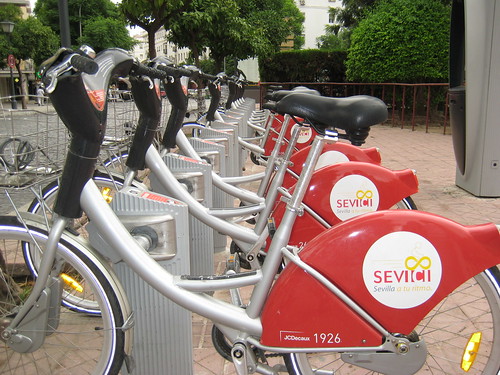
Photo Credit Cayetano
I live in Seville, Spain and this town has a wonderful community bike rental program called Sevici. This is run by the town council and JCDecaux and use of these bicycles is free for the first 30 minutes and in the order of €1 per hour thereafter.
You use an RFID card to access the bicycles and you take bikes from, and return them to stations throughout the city like the one in the photo above. When you return the bike to a station, it is automatically recognised and locked.
Now what if you took this concept and married it with the idea of Car Sharing? And, what if all the cars in the car sharing program were electric (or plug-in hybrids) so that when you returned the car to its station, it plugged itself in and started to charge?
While a model like this wouldn’t work well in a suburban area, if you lived in a city center and had access to something like this, you might never need to buy a car. For cities trying to reduce their levels of pollution, levels of congestion or their carbon footprint, a scheme like this would seem to be a very appropriate step to consider.
A plan like this could also help with electricity grid stabilisation using vehicle to grid technologies.
Would you buy a car if you had an option to (electric) car share?

The problem with a car share is that all of one’s stuff is at one’s house. So in order to go on any trip, you have to first go get that car from wherever it’s stored, then go back to your house. And even for use in any sort of errand (say, going to Home Depot to buy something), the “going to get / return the electric car” becomes two additional legs on any trip. Errands are already such a dreaded thing … having to worry about picking up and returning a car (and then getting home afterward from wherever it’s stored) just sounds like a royal pain. I get that turning things around requires some sacrifice, but I drive my car only once or twice a week anyway. Should I feel racked with guilt by not being interested in an electric car, much less one that I have TO just to use? Seems highly impractical.
Btw: those bikes look awesome. But I live in San Francisco and have personally seen two different bicyclists get hit by cars. I don’t like my chances of opting into that either.
They have the same bike system in Paris called Velib and it is amazingly good. I guess the equivalent for cars here in north america is Zip Car. There are locations within walking distance of many residential areas in Vancouver. Just no plugin hybrids!
@TravisV – I did mention in this post that this system would be suited to people who live in a city center because anyone living in suburbs would have just the difficulties you outline in your comment.
As to the safety issue, in Seville there are dedicated bike lanes to ensure cyclists safety.
@Dave – I was actually thinking of the Zip Car model when writing this post! Now, as you say, if they went plug-in hybrid, they could start selling electricity to the grid!!!
Tom you have really got me thinking about this demand management stuff. In particular I have been running through the particulars of the “electric vehicle as distributed battery” idea – keep in mind I am thinking North American driving habits.
The upcoming Chevy Volt goes about 60km on a charge and the average American’s total daily car commute is on the order of 60km. So one would need a fully charged battery leaving the house in the morning and will have an empty one when they get home with no chance to shuffle energy back and forth with the grid. What am I missing? Maybe it works better if you consider plug-in hybrids (though they only store enough energy for ~5-10km range)? It would most likely work better in Europe?
Hey Dave, you are absolutely correct in your comment – there will have to be some intelligence in this system.
The Volt will have an electric motor and a small petrol motor (solely for charging the battery). You would only sell energy back to the grid from your car when the price you get for that energy exceeds the price of the petrol you will require to charge your battery (think peak demand on calm cloudy days!).
I DO live in a city (and a city – San Francisco – that has great public transportation). But that still doesn’t change the matter of how one gets from their house to drop off location, then back home after using the shared vehicle. That’s two extra legs of travel on top of any time you use that vehicle. If you have to travel across the city to get it, that could be an hour+. As wimpy as it might be to find that so objectionable, I do. I just don’t have enough free time to add a couple of hours worth of inner city commuting per week to and fro a car pickup.
But with the U.S. economy where it is, maybe the best move is to sell my existing car, save the $ from insurance and maintenance, forgo the electric car sharing … and just walk everywhere.
Oh good so I am not totally crazy. That reminds me of a quote that I saw somewhere – maybe on GreenMonk – from Honda saying something along the lines of “if you are buying a hybrid to sell energy to the grid then maybe think about buying a Honda generator” 🙂